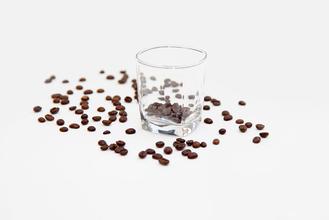Fragrant Jamaican Coffee Flavor description, Grinding degree, Taste characteristics, Variety producing area
The unique flavor of Blue Mountain Coffee is related to its unique geographical location and climatic conditions. Blue Mountain is located in the coffee belt between 25 degrees north latitude and 25 degrees south latitude, with fertile new volcanic soil, fresh air, no pollution, rainy all the year round and great temperature difference between day and night. Most importantly, every afternoon, clouds cover the top of the mountain, which not only shades the coffee trees naturally, but also brings abundant water vapor, which makes the taste and aroma of Blue Mountain coffee outstanding.
Only coffee grown in the Blue Mountain area above 1800 meters above sea level can be called Blue Mountain Coffee. A coffee enthusiast whom the reporter knew in the United States was more "demanding". He insisted: "the coffee grown at an altitude of 2256 meters is Blue Mountain coffee." Coffee beans grown in the lower mountains of the island of Jamaica can only be named "Jamaican alpine coffee" because of their different qualities. In addition, the same coffee tree species, whether planted in Hawaii, Kenya, Papua New Guinea or anywhere else with a similar climate, cannot produce the flavor of blue mountain coffee beans.
Healthy black coffee
The earliest coffee on the island of Jamaica came from Haiti in Latin America in 1728. By 1790, some coffee farmers among the refugees in exile from Haiti had settled in the Blue Mountains and brought coffee-growing technology here. In 1838, Jamaica abolished slavery and allowed liberated slaves to cultivate their own land. Free slaves moved to the mountains to grow coffee and exported it to England. Coffee has come to be known for its admiration by the British upper class. This kind of coffee is the Blue Mountain coffee that fascinates coffee lovers all over the world today.
Pure Jamaican Blue Mountain Coffee perfectly combines the unique sour, bitter, sweet, mellow and other flavors of coffee to form a strong and attractive elegant flavor, which is unmatched by other coffee. People who love Blue Mountain Coffee say: "it is a 'coffee beauty' that combines all the advantages of good coffee." Jim, general manager of Pitt, which is famous for its coffee and tea business in the United States, said of Blue Mountain Coffee: "it tastes fragrant, smooth and mellow, and it makes me feel as precious as a gem. It is precisely because the taste of Blue Mountain coffee is moderate and perfect, so Blue Mountain coffee is generally drunk in the form of black coffee. "
Traditional production technology
Blue Mountain Coffee can maintain today's top status, but also closely related to the local business policy. In 1932, Jamaica adopted a policy to encourage coffee production to reduce the island's dependence on sugar exports. Unlike most coffee-producing countries, the local government does not plant a large number of high-quality and poor-quality coffee in order to increase output, but to give priority to quality, preferring to sacrifice the output of coffee to ensure the quality of Blue Mountain coffee. Therefore, Jamaica is currently one of the countries with low coffee production in the world. Brazil, the world's largest coffee exporter, produces 30 million bags of coffee a year, while Blue Mountain produces only about 40, 000 bags a year.
In addition, the processing and production of Blue Mountain Coffee is also very elegant. Strict and detailed standards have been established for processing, baking and packaging, and there are regulations on what kind of organic fertilizers are needed during the growth period. All are harvested manually at harvest time. Jamaica is also the last country to still transport coffee in traditional wooden barrels.
Only through this series of stringent standards set by the Jamaican Coffee Industry Authority, can coffee obtain a guarantee issued by the government and formally bear the name "Blue Mountain".

Important Notice :
前街咖啡 FrontStreet Coffee has moved to new addredd:
FrontStreet Coffee Address: 315,Donghua East Road,GuangZhou
Tel:020 38364473
- Prev

Kilimanjaro Coffee Flavor description, Grinding degree characteristics, Variety producing area Manor introduction
Tanzania's main coffee producing area, located at the foot of Mount Kilimanjaro, is rich in volcanic soil. Some coffee trees planted here are more than 100 years old. Coffee was first introduced by Christians from Kenya to grow coffee. Coffee trees must be carefully taken care of, weeded and fertilized. And old branches must be cut off so that new branches can grow to maintain the quality of coffee beans.
- Next

El Salvador Coffee Grinding degree Taste characteristics Variety Flavor description Fine Coffee introduction
Many volcanoes in the territory, known as the country of volcanoes, the lowest elevation is 0 meters, the highest is the Santa Ana active volcano 2385 meters. It became a Spanish colony in 1524. Independence from Spain in 1821. In 1824, he joined the Union of Central America, including Guatemala, Honduras, Nicaragua, Costa Rica, and Mexico. In 1841, secession and independence
Related
- Detailed explanation of Jadeite planting Land in Panamanian Jadeite Manor introduction to the grading system of Jadeite competitive bidding, Red bid, Green bid and Rose Summer
- Story of Coffee planting in Brenka region of Costa Rica Stonehenge Manor anaerobic heavy honey treatment of flavor mouth
- What's on the barrel of Blue Mountain Coffee beans?
- Can American coffee also pull flowers? How to use hot American style to pull out a good-looking pattern?
- Can you make a cold extract with coffee beans? What is the right proportion for cold-extracted coffee formula?
- Indonesian PWN Gold Mandrine Coffee Origin Features Flavor How to Chong? Mandolin coffee is American.
- A brief introduction to the flavor characteristics of Brazilian yellow bourbon coffee beans
- What is the effect of different water quality on the flavor of cold-extracted coffee? What kind of water is best for brewing coffee?
- Why do you think of Rose Summer whenever you mention Panamanian coffee?
- Introduction to the characteristics of authentic blue mountain coffee bean producing areas? What is the CIB Coffee Authority in Jamaica?

